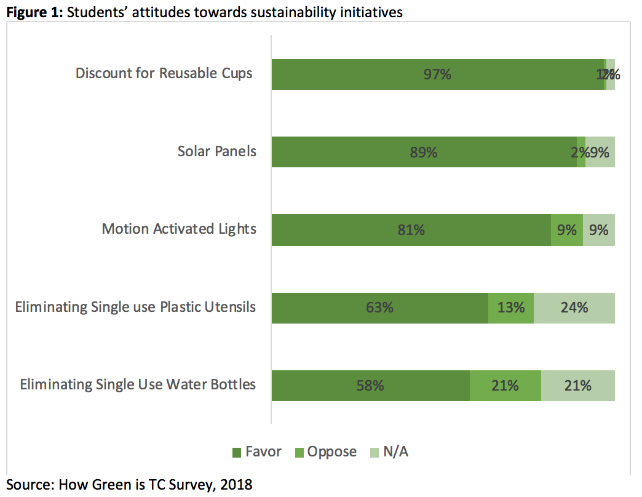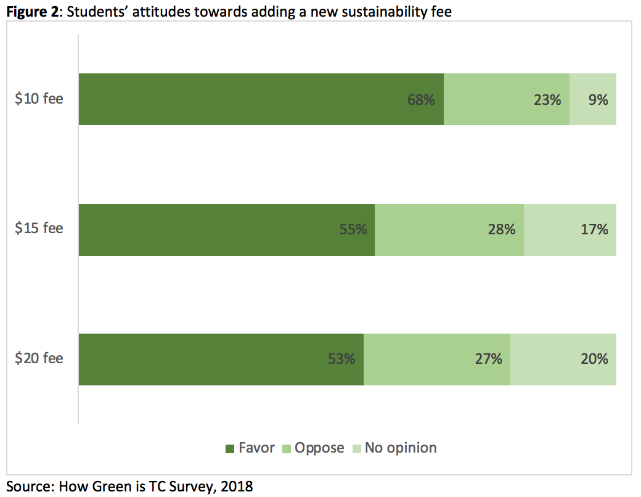Darren Rabinowitz (dr3011@tc.columbia.edu)
Madalina Ciocanu (mc4561@tc.columbia.edu)
Woo-Jung Kim (wak2118@tc.columbia.edu)
Kairat Kurakbayev (kk3282@tc.columbia.edu)
With Teachers College’s community constantly growing, our ecological footprint is more impactful than ever. As one of the leading educational institutions in the field, it is imperative that we address this issue on an academic and organizational level. Mainstreaming sustainable initiatives across administrative units and departments has the potential of ensuring our commitment to a secure, educated, and empowered future generation.
In this project we sought to better understand what TC students think about concrete ways to reduce the College’s ecological footprint (i.e., . the ecological assets – nature – that a given population requires to produce the natural resources it consumes). Results are based on an online survey conducted on October 29th - November 19th, 2018 among a sample of 480 students at Teachers College, Columbia University. This school wide survey was part of a larger sustainability research project as part of Dr. Oren Pizmony-Levy’s ITSF 5031: Environmental and Sustainability Education course. Throughout the survey’s duration, 12 students who were part of this course, promoted the survey to other TC students and faculty through recycled cardboard advertisements and personally asked TC students and faculty to take the survey.
Most of the survey items were developed by the aforementioned ITSF 5031 students, two support staff, and Dr. Oren Pizmony-Levy. The survey questions revolved around respondent’s demographics, students’ understanding of sustainability and environment, how well TC’s departments/programs teach and discuss sustainability, possible effects climate change has on TC compared to where respondents reside, and possible sustainability initiatives that could be implemented at TC.
Proposed Sustainability Initiatives. Most initiatives presented in the survey are supported by TC students, as illustrated in Figure 1. The initiatives can be broken down into two categories – changes pertaining to individual conveniences and changes in facilities management. Up to two-thirds of students support individual waste reduction actions; for example, eliminating single use plastic plates and utensils (71%), eliminating single use water bottles (65%) and offering discounted beverages for the use of reusable cups (97%). Additionally, TC students support significant changes to the TC facilities use of sustainable energy sources, with 89% of respondents support installation of solar panels, and 81% of respondents support motion activated lights.
Funds Reallocation. While most sustainability initiatives require an upfront investment, the return on investment would greatly outweigh startup costs. We asked respondents whether they favor/oppose adding a special fee for sustainability initiatives at College. Using experimental design, students were asked whether they support or oppose differing amounts of a sustainability fee - $10, $15, and $20 (students were randomly assign to these conditions).
Across all levels, at least half of the respondents were in favor for the implementation of a fee specifically allocated to sustainability initiatives (see Figure 2). The lowest fee, $10 was supported by a large majority of students (68%). Open-ended comments suggest that while many students have reluctance towards adding extra spending for students, they did support the reallocation of current funds to sustainability, rather than increasing the students’ fees. The following quote(s) demonstrate this sentiment:
“I opposed the $20 fee for a sustainability fund, because we pay an exorbitantly high tuition. I strongly support the idea of a sustainability fund, with the money funneled from other sources...”
“Regarding the additional 15 dollars for sustainability fee, I believe the idea of having a certain amount available for sustainability initiatives is great, but the school is already extremely expensive… Maybe instead of adding a fee, the school should consider allocating resources differently.”
Overall, our analysis of data from the How Green Is TC survey suggests that students are willing to make changes in order to reduce the College’s ecological footprint. The overall community tendency to stimulate sustainability on campus leans towards (1) specific, tangible action of reducing consumption and (2) fund re/allocation towards the considered initiatives. While the survey offers a clear perspective supported by the campus community, we hope TC leadership and administration will include these in its action plan for the 2019-2020 fiscal year.


